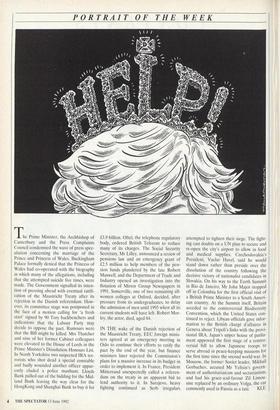PORTRAIT OF THE WEEK
The Prime Minister, the Archbishop of Canterbury and the Press Complaints Council condemned the wave of press spec- ulation concerning the marriage of the Prince and Princess of Wales. Buckingham Palace formally denied that the Princess of Wales had co-operated with the biography in which many of the allegations, including that she attempted suicide five times, were made. The Government signalled its inten- tion of pressing ahead with eventual ratifi- cation of the Maastricht Treaty after its rejection in the Danish referendum. How- ever, its committee stage was postponed in the face of a motion calling for 'a fresh start' signed by 90 Tory backbenchers and indications that the Labour Party may decide to oppose the pact. Rumours were that the Bill might he killed. Mrs Thatcher and nine of her former Cabinet colleagues were elevated to the House of Lords in the Prime Minister's Dissolution Honours List. In North Yorkshire two suspected IRA ter- rorists who shot dead a special constable and badly wounded another officer appar- ently eluded a police manhunt. Lloyds Bank pulled out of the bidding for the Mid- land Bank leaving the way clear for the HongKong and Shanghai Bank to buy it for £3.9 billion. Oftel, the telephone regulatory body, ordered British Telecom to reduce many of its charges. The Social Security Secretary, Mr Lilley, announced a review of pensions law and an emergency grant of £2.5 million to help members of the pen- sion funds plundered by the late Robert Maxwell, and the Department of Trade and Industry opened an investigation into the flotation of Mirror Group Newspapers in 1991. Somerville, one of two remaining all- women colleges at Oxford, decided, after pressure from its undergraduates, to delay the admission of men until 1995 when all its current students will have left. Robert Mor- ley, the actor, died, aged 84.
IN THE wake of the Danish rejection of the Maastricht Treaty, EEC foreign minis- ters agreed at an emergency meeting in Oslo to continue their efforts to ratify the pact by the end of the year, but finance ministers later rejected the Commission's plans for a massive increase in its budget in order to implement it. In France, President Mitterrand unexpectedly called a referen- dum on the treaty in an apparent bid to lend authority to it. In Sarajevo, heavy fighting continued as Serb irregulars
attempted to tighten their siege. The fight- ing cast doubts on a UN plan to secure and re-open the city's airport to allow in food and medical supplies. Czechoslovakia's President, Vaclav Havel, said he would stand down rather than preside over the dissolution of the country following the decisive victory of nationalist candidates in Slovakia. On his way to the Earth Summit in Rio de Janeiro, Mr John Major stopped off in Colombia for the first official visit of a British Prime Minister to a South Ameri- can country. At the Summit itself, Britain acceded to the controversial Biodiversity Convention, which the United States con- tinued to reject. Libyan officials gave infor- mation to the British chargé d'affaires in Geneva about Tripoli's links with the provi- sional IRA. Japan's upper house of parlia- ment approved the first stage of a contro- versial bill to allow Japanese troops to serve abroad in peace-keeping missions for the first time since the second world war. In Moscow, the former Soviet leader, Mikhail Gorbachev, accused Mr Yeltsin's govern- ment of authoritarianism and sectarianism, and had his grace-and-favour Zil Limou- sine replaced by an ordinary Volga, the car
commonly used in Russia as a taxi. KLE


















































 Previous page
Previous page